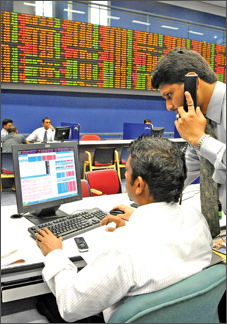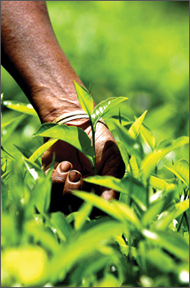|
Despite many global repercussions:
Galloping development in many spheres
Sanjeevi JAYASURIYA
|

Dawn of peace has given a new life to stock market activities.
File photo |
The fourth anniversary of the assumption
of office of President Mahinda Rajapaksa was held November 18. Daily
News interviewed Finance Ministry Secretary Dr. P.B. Jayasundera. Here
are his comments on the country's four year progress.
The four year period of the President's administration progress is in
several fronts apart from security.
Rapid progress in implementation of infrastructure at the time the
President took office was necessary and the country was demanding
infrastructure in ports, power, highways, waste disposal and aviation.
This was same at national level as well as provincial and the rural
levels where infrastructure has been neglected and rural economy was
lagging behind in economic development. When President Rajapaksa assumed
Office he had to address these issues.
The most pressing need was to raise money for these massive
infrastructure development activities and to ensure that these projects
were implemented fast. The President had the task to balance
infrastructure development and to carry out the equally important fight
against terrorism. Today we have a success story.
Not only defeating terrorism, but the construction of Puttalam Coal
Power Plant, Hambantota Port, islandwide road network and Colombo-
Katunayake expressway, very expensive and strategically important
bridges and flyovers, electricity distributions, water schemes to ensure
drinking water, long overdue Moragahakanda and Uma Oya irrigation
projects and 14 other major irrigation projects such as Deduru Oya were
carried out during this period. The development of economic
infrastructure was equally matched by other infrastructure facilities
such as convention and administration centres in many cities, performing
art centre, international cinema and tele drama studio.
Various activities have got off the ground and are in the final
stages and could be used by the public by mid next year.
At the provincial and the rural level, road expansion and
electrification are in progress with the aim to provide electricity for
85 percent of the country's population. Projects are being carried out
to provide quality drinking water and pipe borne water and to provide
telecommunication facilities.
The biggest progress was the islandwide expansion of infrastructure
development connecting the entire country to explore its economic
potential through infrastructure development.
The importance of agriculture development placed by the Government is
evident in the food security. Policy framework theme accorded a
significant role in our development program. A comprehensive approach
was adopted to provide fertilizer at an affordable and stable price for
farming community, concessional credit, agricultural marketing
facilities, incentives for post and pre - harvest agriculture practices,
attractive and remunerative prices for key agriculture products such as
paddy, potato, maize, onion and incentives for large investment,
incentives for agricultural exports and irrigation projects.
|

Tea - a major foreign exchange income generator. File photo |
The Government was blessed with weather being absolutely favourable.
Today the stock of paddy the country has if internationally priced is
worth US $ 2,000 million because the country was able to grow its staple
food in Sri Lanka. The country need not spend on import of rice and
manage to provide food security whereas the world went through a major
food crisis.
The country was importing its entire requirement of animal feed and
most depended heavily in import of wheat flour and milk powder. The
Government gave incentives for local farmers and removal of subsidies
given to importers during the four years resulted in progress of local
products. The Government has also make progress by increasing the local
maize production up to 50 percent of the country requirement. There is
also increase in investment now taking place in local dairy and poultry
industry due to the policies implemented when the President took office.
At that time the country's agriculture and even agriculture based
industrial activities were neglected. For example, the country did not
have adequate milling capacity and the small millers were neglected. The
large scale millers did not have machinery and equipment. There were no
storage facilities. During the past four years the Government gave
import facilities to the rice processing millers to import machinery and
equipment to encourage rice processing industry in the country. The
millers who had debt problems could not expand their business activities
and hence all the debts were re-structured to develop the milling
industry and similarly milling and processing aspects of animal industry
too was developed. Tea factories were modernized and food processing
companies were developed. There was a significant boost in the agri
based industries. The Sri Lankan economy could proudly speak of
development of local entrepreneurship of every sphere of activity. The
domestic value addition was improved with widespread incentives to
promote local entrepreneur initiatives in the country.
The commitment to expand education and health service by recruitment
of doctors, nurses and other supportive staff in the field of health and
recruitment of teachers in the field of education are noticeable. The
modernization of schools and health infrastructure are yet another
facets of development in the past four years.
The University intake has increased to 20,000 and the President
directed to upgrade the facilities of existing universities particularly
located in distant areas.
Recognizing a major difficulty in our system of education a new
university for vocational studies and training colleges for other
skilled categories has been set up. A degree offering program has been
designed for nursing education in the country.
All in all in the field of education, the four year period has
promoted Sri Lanka towards a knowledge and skilled based economy.
English and IT have been recognized as a major investment in education
reforms. The rural areas have been equipped with IT institutions and a
large number of Nenasala Centres have been set up.
The public service in the country at the time this Government took
Office was at a fragile state. There was wide range of salary anomalies.
The institutions were run down.
There was no recruitment and training of staff and vital areas such
as field level services were grossly neglected. It was a huge time
consuming and a costly exercise to revitalize the public service.
In spite of other challenges the President appointed a Salary
Commission to provide salary structure recommendations and to provide
other facilities of training, housing, vehicles, modern office
buildings, computer facilities. In fact, in addition to almost 100,000
recruited to the public services in various fields such as teaching,
medicine, tax and civil administration, planning and various other
technical grades salaries have been revised virtually by 100 percent.
The lowest ranking employee in the Government services now gets Rs.
11,670 per month plus Rs. 4,500 COL allowance in comparison to around Rs.
8,000 in 2005.
The welfare aspect of the public sector too was addressed. Prior to
2005, only 5,000 housing loan applications could be provided by the
Budget, but during the past four years through the banking system nearly
35,000 housing loan applications were entertained and a further 15,000
are being processed to be completed by December this year. More progress
was in the area of market intervention to safeguard the lower-end of our
consumer society.
The closure of the CWE, Paddy Marketing Board, run down in the
co-operative system has reduced market access to small income
households. During the past four years steps taken to reactivate the
co-operative system, establish 300 Co-op cities and outlets, expand the
number of dedicated economic centres up to ten to provide essential
consumer goods at affordable prices to lower income groups.
Sri Lanka's economy was placed on a growth rate of six percent during
this four-year period except for three quarters of 2009, due to global
recession and its adverse consequences in the Sri Lankan economy.
During the four year period, the Government was able to raise foreign
reserves in excess of US $ 5.5 billion.
The country was able to perform well because of good export growth,
massive remittance inflow and foreign investment. Foreign Direct
Investment (FDI) on average increased to US $ 750 million per year.
The foreign investors place confidence on Sri Lankan Government
treasury bonds. They have selected Sri Lankan treasury bonds like any
other Government foreign securities as their investment.
As a middle income country, Sri Lanka has also been able to show its
active presence in the international capital market. Both issues of
Government bonds of 2007 and 2009 were oversubscribed. The Rating Agency
has given a strong positive economic outlook in the middle income
rating.
The economic outlook in the post war regime has improved considerably
after defeating the LTTE. The prospects in the tourism, foreign
investment, capital market and development of agriculture, fisheries,
industries and wide range of services activities have continuously
increased. The outlook in the tourist sector demands the creation of an
additional 14,000 room capacity to augment the country's present
accommodation facilities for tourists.
This alone will boost the prospects of the construction industry. It
will also demand a wide range of skills and property development.
The country's remittances income was raised from US $ 1,500 million
to US $ 3,200 million. The country's per capita income was raised from
US $ 1,000 to 2,000 and poverty declined from 24 percent to 15 percent,
unemployment declined to 5 percent and inflation recorded low level of 5
percent.
All in all, it was a success story under the difficult global and
domestic environment.
The President’s
Words...
We did not win independence for the benefit of one community
alone. The Sinhalese, Tamils, Muslims, Burghers, Malays and all
participated in the freedom struggle. None of us wanted freedom
for a divided country. We all wanted freedom for a single
country.- on Freedom
Day February 4, 2008
The defeat of the LTTE and the breakdown of
their armed strength will never be the defeat of the Tamil
people of this country. What have the Tamil people inherited
from the gun that was used to assassinate Alfred Duraiyappah to
the armed tanks used to attack the innocent Tamil people who
were fleeing Pudumathalan, and all other weapons of the LTTE?
What was the LTTE able to win for the Tamil people from the
force of its arms? The complete defeat of the LTTE is an even
greater victory for the Tamil people.
- at the ceremonial opening
of Parliament Sri Jayawardhanapura - Kotte, May 19, 2009.
The task before us is to make
maximum use of our natural resources in our skies, our land, our
beaches and the sea. We have the huge task of making every inch
of land productive and extract from nature all resources needed
for a free country. I am convinced that our Sri Lankan nation
has the strength to achieve this. Accordingly, our resolve will
take us to the creation of a truly free and independent nation
in our motherland.
- on Freedom Day February 4,
2008 |
|

